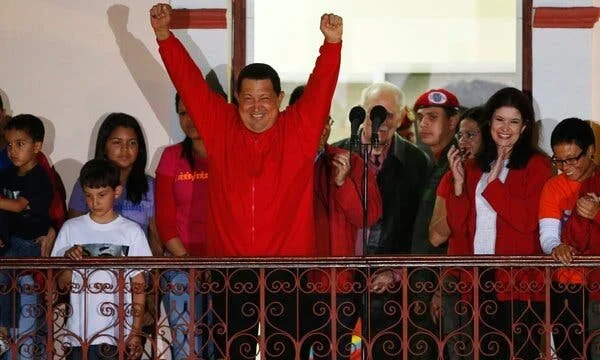Robbers On The Run In Latin America
Venezuela’s socialist President, Hugo Chavez, has announced his country’s intention to formally withdraw from the International Monetary Fund and the World Bank. Chavez chose International Workers’ Day (May 1) to make the announcement.
The two institutions have induced dozens of countries, particularly in Africa and Latin America, to privatise their resources and services for the benefit of multinational companies. Any financial loans gained as a result of this asset stripping exercise are then expected back with interest. They are amongst the capitalist worlds most efficient mechanism, for driving forth an agenda of poverty and perpetual economic slavery for poorer nations.
The institutions have also been active in Europe, encouraging the British government, among others, to privatise the water supplies under their control.
Making the announcement Chavez bluntly gave his reasons for the move: “I want to formalise our exit from the World Bank and the International Monetary Fund. We are going to withdraw before they go and rob us.”
Venezuela has gradually reduced its cooperation with the IMF and World Bank since the election of Chavez in 1999 and announced its final payment to the WB this month. In an initiative aimed at fostering solidarity between nations as opposed to cut-throat competition, the Latin American country is aiming to establish a ‘Bank of the South’ that would be backed by their massive oil revenues. This bank would in-turn fund local and national projects on a fair economic basis.
The day before the Venezuelan announcement, Nicaragua’s recently elected President Daniel Ortega expressed his own desire to see his nation “get out of that prison” of IMF debt, declaring “we are negotiating with the Fund to leave the Fund.”
Meanwhile, Venezuelas nationalisation program continues to gather pace with the announcement that the state oil company PDVSA will take a 60% hold of all oil exploration projects in the countries main oil producing region, the Orinoco basin.
Commenting on the developments, Éirígí spokesperson Brian Leeson said they contrasted heavily with the state of Irish society. “While the political parties of the Twenty Six Counties are trying to outdo each other in the ‘who-can-be-the-most-economically-conservative’ stakes ahead of the election, the people of Latin America are setting an example of what politics should really be about.
“That is, the long-term mass participation of people in securing self-determination and a better future for themselves and those who come after them.”

